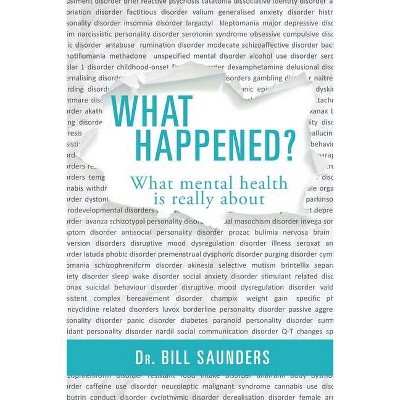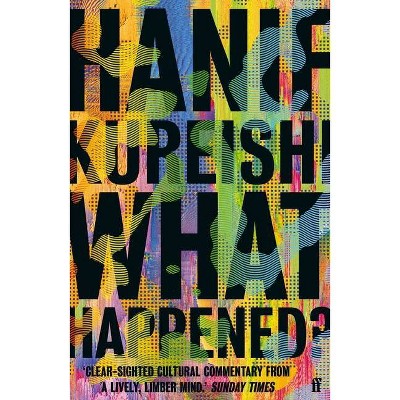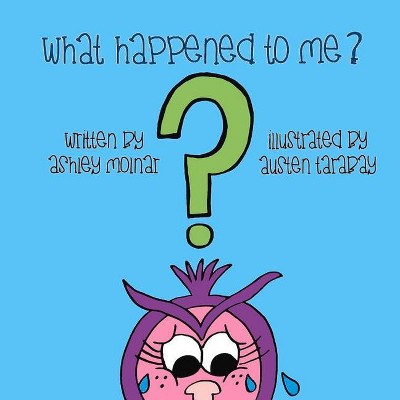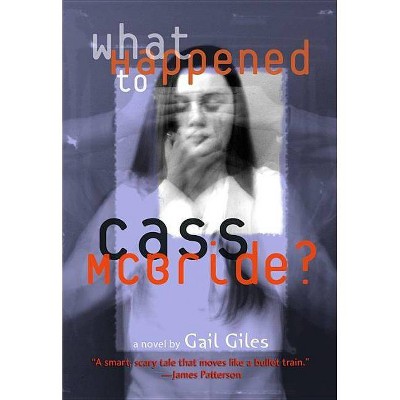What Happened? - by Bill Saunders (Paperback)

Similar Products
Products of same category from the store
AllProduct info
<p/><br></br><p><b> About the Book </b></p></br></br><p>Leading psychologist Dr. Bill Saunders takes us on an open, honest, heartfelt, and sometimes confronting journey of what Mental Health is really about.</p><p/><br></br><p><b> Book Synopsis </b></p></br></br><p>If you consult a psychiatrist for assistance with a mental health problem you will be subjected to the "What's wrong with you?" approach. You will be assessed, diagnosed and then treated, most commonly with a pill to combat your purportedly biologically based ill.</p><p><br></p><p>But what if this is a hazardous and flawed paradigm? What if psychiatrists are inherently unable to reliably diagnose what ails you? Or, despite the listing of over 250 'mental illnesses' in the Diagnostic and Statistical Manual of Mental Disorders, what if there are only eight different types of interventions available to treat this myriad of different 'mental illnesses?'</p><p><br></p><p>Furthermore, what if you take pills that change your brain biochemistry, but the biological basis of all the purported 'mental illnesses' are unknown?</p><p>Could there be an alternative? And just maybe, are we being asked the wrong question?</p><p><br></p><p>With over 40 years as a practicing psychologist and educator, Dr. Bill Saunders takes us on an open, honest, heartfelt and sometimes confronting journey of human experience. In his book, Bill challenges some of the 'truths' we know about mental health, sharing real stories that will make you laugh and cry, and sometimes leave you in shock!</p><p><br></p><p>So, if you want to know what Mental Health is really about this is the book to read.</p><p/><br></br><p><b> Review Quotes </b></p></br></br><br><p><strong>Review of "What Happened: What Mental health is really about" by Bill Saunders.</strong></p><p><br></p><p>Many psychotherapists have tried to write practical and entertaining books that convey the lessons gained through their work. Saunders' work stands apart in its boldness and its iconoclasm. He is not afraid to take on the sacred cows in the field which most others tiptoe around. Saunders is clearly an experienced and entertaining educator. He is less cautious and more extroverted than many others in his profession. However, this is balanced by his passion for trying to be truly helpful as well as an understanding of the private worlds of his clients. There are echoes of R.D. Laing in this approach. This is especially evident in his deep respect, if not love, for his clients.</p><p>This book is primarily written for psychotherapists and indeed anyone with an active interest in how to help people with what can be broadly described as "mental health issues". It deals very much with the immediate and practical demands of dealing with individuals in crisis. It contains gems of therapeutic wisdom mined from a life time of work trying to help people in mental distress. This book represents some of the key lessons a good supervisor could convey to a new practitioner or indeed any therapist.</p><p>The author's love for his work shines through on every page. The book is in the genre of works written by psychotherapists trying to convey the challenges and the useful approaches of what they have learned through experience. The best-known series of books in this area would be the series of works by Irvin Yalom.</p><p>The book is modeled on Yalom's style of conveying essential therapeutic points through the medium of case studies that are presented as dramatic stories with a significant twist - often right at the end. So in many ways, it reads like a psychotherapy detective story with the author in the role of something of a Sherlock Holmes pointing out to the reader how to read a case and manage the investigation that reveals the true cause of the suffering of the patient and what is needed in terms of a remedy.</p><p>Apart from the case studies and elucidation of psychotherapeutic methods, the book provides a stinging critique of the medical model approach to mental health. This centers on a systematic debunking of the psychiatric approach and in particular the "psychiatric bible" - the Diagnostic and Statistical Manual of Mental Disorders. Here we see echoes of Thomas Szasz and his work on the "myth of mental illness".</p><p>The author goes further and deeper and suggests that the approach to mental distress needs to be based not on unknown supposed causes but on "what happened." That is, looking at the distress as being most likely the effect of various traumas and disruptions to normal psychological development. This is sometimes referred to as a "trauma-informed" approach to psychotherapy.</p><p>The book also contains a comprehensive assault on the use of psychiatric medication. Medications that are commonly in use and often the only treatment provided to the many individuals appearing for a visit to the General Practitioner with a psychological problem. Saunders cites widely on a range of others who have questioned the overuse of psychiatric medications.</p><p>The book will be of interest to anyone active in the field of the treatment of mental health problems. It presents a significant challenge to the orthodoxy governing the field and should lead to a productive debate aimed at enhancing the delivery of services to those in need.</p><br>
Price History
Price Archive shows prices from various stores, lets you see history and find the cheapest. There is no actual sale on the website. For all support, inquiry and suggestion messages communication@pricearchive.us




















